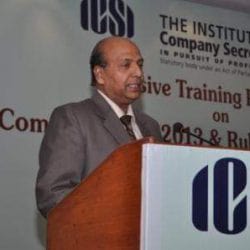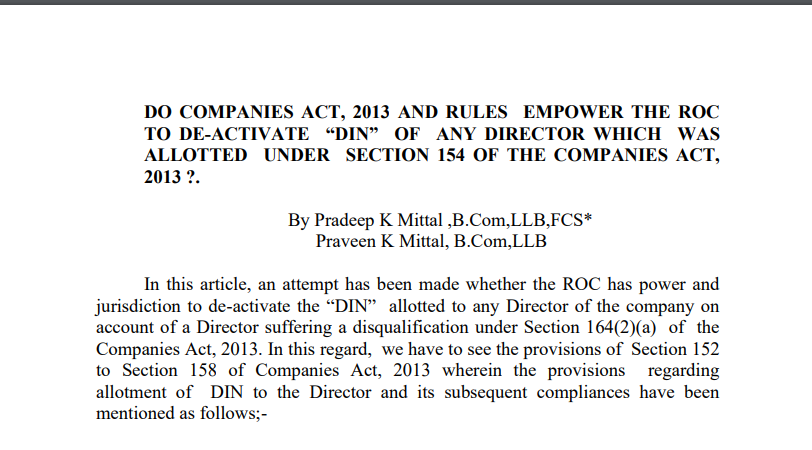Do Companies Act, 2013, and Rules Empower The ROC to De-activate “DIN” of Any Director Which was Allotted Under Section 154 of The Companies Act, 2013 ?.
Do Companies Act, 2013, and Rules Empower The ROC to De-activate “DIN” of Any Director Which was Allotted Under Section 154 of The Companies Act, 2013 ?.
In this article, an attempt has been made whether the ROC has power and jurisdiction to de-activate the “DIN” allotted to any Director of the company on account of a Director suffering a disqualification under Section 164(2)(a) of the Companies Act, 2013. In this regard, we have to see the provisions of Section 152 to Section 158 of Companies Act, 2013 wherein the provisions regarding allotment of DIN to the Director and its subsequent compliances have been mentioned as follows;-
2: The Registrar of Companies in case of default under Section 164(2)(a) of the Companies Act, 2013 passed the order under Section 167 of Companies Act, 2013 whereby the Director was declared disqualified and his/her DIN were deactivated and the said list of disqualified Directors was first published on 15.09.2017 and consequently, Directors were declared disqualified for a period of five years from 01.11.2016 to 31.10.2021 and subsequently further lists were published from time to time by the Registrar of Companies.
3: After the publication of list on 15.09.2017 whereby Directors were declared disqualified for a period of five years from 01.11.2016 to 31.10.2021, writ petitions were filed in various High Courts all over India challenging the list published on 15.09.2017 of Directors who incurred the disqualification under clause (a) of Section 164(2) of the Companies Act, 2013 for default on the part of concerned companies in filing the annual returns and financial statements for the financial years 2014-2016. The Petitioners also challenged that the ROC has no power to de-activate the DIN of the Directors under the Companies Act, 2013 as well the Company (Appointment and Qualification of Directors) Rules,2014. The Petitioners also challenged that neither any show-cause notice has been issued nor any personal hearing was granted before taking this drastic action of de-activation of DIN.
Related Topic:
Appointment of CFO under Companies Act, 2013
4: Now, we have to see whether the ROC has the powers to de-activate the DIN allotted to the Directors due to default under Section 164(2) (a) of the Companies Act, 2013 for default on the part of concerned companies in filing the annual returns and financial statements.
5: In my humble view, the answer is no. There is no power vested with ROC to de-activate the DIN of the Directors under the Companies Act, 2013 as well the Company (Appointment and Qualification of Directors) Rules,2014. The provisions of DIN are mentioned in Section 152 to 158 of the Companies Act, 2013 and in case of non-compliance of these Sections, provisions of penalty has been given in Section 159 of Companies Act, 2013. The aforesaid view is supported by following judgments passed by various Hon’ble High Courts:-
6: The Hon’ble Gujarat High Court in the case of Gaurang Balwantlal Shah Vs. Union of India MANU/GJ/1278/2018 has held as follows:-
The Rule 11 of Company (Appointment & Qualification of Directors) Rules, 2014 does not contemplate any suo motu powers either with the Central Government or with the authorized officer or Regional Director to cancel or deactivate the DIN allotted to the Director, nor any of the clauses mentioned in the said Rule contemplates cancellation or deactivation of DIN of the Director of the “struck off company” or of the Director having become ineligible under Section 164 of the said Act. The reason appears to be that once an individual, who is intending to be the Director of a particular company is allotted DIN by the Central Government, such DIN would be valid for the lifetime of the applicant and on the basis of such DIN, he could become Director in other companies also. Hence, if one of the companies in which he was Director is “struck off”, his DIN could not be cancelled or deactivated as that would run counter to the provisions contained in Rule 11, which specifically provides for the circumstances under which the DIN could be cancelled or deactivated.
In that view of the matter, the Court is of the opinion that the action of the respondents in deactivating the DINs of the petitioners-Directors along with the publication of the impugned list of Directors of “struck off” companies under Section 248, also was not legally tenable.
Related Topic:
Why Struck off Company should get Restored immediately.
7: The Telangana High Court in the case of Venkata Ramana Tadiparthi Vs. The Union Of India WP No.5422 of 2019 dated 18.7.2019 has held as follows:-
28. Clauses (a) to (f) of Rule 11 provides for the circumstances under which the DIN can be cancelled or deactivated. The said grounds are different from the ground envisaged under Section 164(2)(a) of the Act. Therefore, for the alleged violation under Section 164 of the Act, DINs cannot be cancelled or deactivated, except in accordance with Rule 11 of the Rules.
30. The deactivation of the DINs of the petitioners for alleged violations under Section 164 of the Act, cannot be sustained.
8: The Hon’ble Delhi High Court in the case of Mukut Pathak & Ors. Vs. Union of India & Anr. 2019 (265) Delhi Law Times Page 506 has held as follows:-
106. Neither any of the provisions of the Companies Act nor the Rules framed there-under stipulate cancellation or deactivation of DIN on account of a director suffering a disqualification under Section 164(2) of the Act. It is relevant to note that Rule 11 of the Company (Appointment and Qualification of Directors) Rules, 2014 was amended with effect from 05.07.2018 to provide for deactivation of DIN in the event of failure to file Form DIR-3-E-KYC within the period as stipulated under Rule 12A of the said Rules. The amendment so introduced also does not empower the Central Government to cancel or deactivate the DIN of disqualified directors.
108. It is important to note that whereas a DIN is necessary for a person to act as a director; it is not necessary that a person who has a DIN be appointed as a director. Section 164(2) only provides for temporary disqualification for a period of five years for a person to be appointed/re-appointed as a director. Thus, it is not necessary that the DIN of such a person to be deactivated.
109. It is also material to note that sub-section (2) of section 167of the Act provides for punishment for any person who functions as a director knowing that his office has become vacant on account of his disqualification as specified in Section 167(1) of the Act. Thus, Section 167 includes a mechanism for enforcing the rigors of Section 167(1) of the Act. In the present case, the respondents have sought to cancel/deactivate the DIN of directors disqualified under Section 164 (2) of the Act. This has been done to enforce the provisions of Section 167 (1) of the Act. Clearly, this is not supported by any statutory provision. This Court is of the view that the Central Government has framed the rules specifying the conditions in which a DIN may be cancelled, cannot cancel the same on any other ground, and without reference to such rules.
110. Similarly, there is also no provision supporting the respondents’ action of cancelling the DSC of various directors. The said action is therefore unsustainable.
9: The Division Bench of Allahabad High Court (Lucknow Bench) in the case of Mohd. Tariq Siddiqui & Anr. Vs U.O.I = Civil Misc No. 16173 of 2019 dt.5.10.2019, has held as follows:-
7. It was de-activated on account of disqualification in one company affecting the Director Identification Number for the other companies. The opposite parties are directed to activate the Director Identification Number for use for other companies. The opposite parties would, however, be at liberty to take legal action against the petitioners for any statutory default or non-compliance of the provisions of the Act of 2013.
10: The Division Bench of Allahabad High Court in the case of Jai Shankar Agrahari Vs. U.O.I. & Anr. MANU/UP/0093/2020 has held as follows:-
We hold that in absence of any provision to deactivate DIN of petitioners if they have incurred disqualification under Section 164 of Act, 2013, the action of respondents and in particular of ROC, in deactivating DIN of petitioners, cannot be sustained.
83. We also quash the list published by ROC, declaring petitioners in all these writ petitions as disqualified to be Directors of companies and debarment of being Director for a period of five years.
11: Finally in a recent judgment dated 18.03.2020 rendered by Calcutta High Court in the case of Imraj Ali Molla Vs UOI. MANU/WB/0447/2020 has also reiterated the position as culled out from the above-referred judgments, and observed as follows:
17. The disqualification of the DIN of the petitioners could not operate in respect of other companies than the defaulting company. In the event the DIN of a director is to be deactivated and not merely the name of the company struck out from the RoC, the said person has to be given notice individually and heard and given an opportunity to establish that he was not liable for the alleged default committed by the company.
8. The Division Bench of the Allahabad High Court went one step further by holding that the RoC cannot deactivate the DIN only on the ground that a director has incurred disqualification under Section 164(2)(a) or his office has become vacant under Section 167(1)(a). Since such DIN is allocated under section 154 of the 2013 Act, and there is no provision in the Act for the deactivation of the DIN of a director only on the ground of such disqualification under Section 164(2)(a) or Section 167(1)(a), the action of the RoC in the present case, in deactivating the DIN of the petitioners on the ground of such violation of Section 164(2)(a) of a particular company cannot confer a right on the RoC to deactivate such DIN. In the absence of any such provision of deactivation of DIN in the 2013 Act, the mere disqualification under Section 164(2)(a) of a company cannot give rise to the consequence of deactivating the DIN, for which there is no provision in the statute. In case of contravention of any of the provisions of Sections 152,155 and 156, punishment is provided under Section 159 of the 2013 Act. However, there is no scope of deactivation of an existing DIN on any ground whatsoever in the 2013 Act.
19. The respondents are directed to immediately reactivate and/or allocate new DIN numbers if their previous numbers have been allocated to some other directors.
12: Another Hon’ble Division Bench of Allahabad High Court in the case of Jai Shankar Agrahari Vs. U.O.I. & Anr. MANU/UP/0093/2020 and Calcutta High Court in the case of Imraj Ali Molla Vs Union of India & Ors. MANU/WB/0447/2020 has a hold that before deactivation of DIN, the opportunity of hearing has to be given to the Directors.
13: Hence, from the above discussion and the judgments referred, it is crystal clear that the ROC has no power to deactivate the DIN of any Director in case of default under Section 164(2)(1) of the Companies Act, 2013. Even if, the ROC wishes to take any action against the Defaulting Company and its Directors, he has to provide the opportunity of hearing before taking any action against them – in other words, follow the principle of natural justice.
Download the copy:
If you already have a premium membership, Sign In.
 Advocate Pradeep Kumar
Advocate Pradeep Kumar
PK Mittal BCom Delhi university 1975 LLB Delhi University 1978 FCS Fellow Member of ICSI 1992 1982 to 1992 as CS in Corporate Head Legal Apollo Tyres Ltd 1986 to 1992 1993 onwards Advocate in Delhi High Court CESTAT NCLT = Practcising Indirect Tax and Corporate laws 1993 to till date. Written more than 100 Article on Company Law and Corporate laws Indirect Tax Speaker on Indirect Tax Co Law and IBC in various Seminars Workshop organised by ICAI ICSI and ICMA and other organisations Convenor Core Group on GST of ICSI













